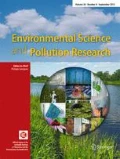Coronaviruses (CoV) are a large family of viruses that can infect animals and humans. Many known coronaviruses caused a range of respiratory infections in humans, such as MERS-CoV and SARS-CoV. In rare cases, animal coronaviruses infect humans and then spread between them. SARS-CoV-2 is a new virus that has led to the outbreak of a respiratory disease known as novel coronavirus 2019 (COVID-19). The new virus is spreading rapidly around the world and devastated every country with many deaths. Evidences show that COVID-19 transmission occurs primarily between individuals through direct contact and then indirectly through close contact with infected persons via contaminated secretions or respiratory droplets of the infected person during coughing, sneezing, or while talking.
Healthcare centers, especially hospitals, are environments that can be the site of outbreaks of infectious diseases such as COVID-19. Therefore, if environmental and public health is not well monitored in these centers, staff and patients will face severe risks of viral and bacterial infections. Although healthcare professionals and other front-line workers are working round the clock to combat COVID-19, public participation is also essential to rapidly control the pandemic worldwide. Therefore, creating awareness among the public and sharing health protocols in order to control this epidemic are very important.
The protocols are rapidly changing, due to the severity prevailing at that situation, as well as more and more data from various sources are available. To address the issues and identify the source of spreading, researchers are constantly exploring the root cause and mitigating measures. Over the time, many research studies were conducted, and salient outcomes emerged.
To examine the measures that can be adopted at the time of a novel coronavirus outbreak to mitigate environmental contamination and impact on human health, the editors have edited a book, titled Environmental and Health Management of Novel Coronavirus Disease (COVID-19). Contributions come from virologists, microbiologists, public health professionals, environmental health managers, and policy makers. Further, to highlight how the coronavirus pandemic may have influenced the United Nations (UN) sustainable development goals (SDGs) and their implementation, research works related to COVID-19 and SDGs were compiled in an editorial book, COVID-19 and the Sustainable Development Goals.
There has been tremendous research carried out in the area of environmental engineering. However, there are limited single source in this perspective. To highlight the recent and relevant research studies in environmental engineering, this special issue (SI) is proposed and launched. This SI can be very effective in raising awareness to prevent and control COVID-19 through various environments such as air, wastewater, medical wastes, food products, and different surfaces. Research works related to COVID-19 in environmental engineering perspective are invited to this SI. Manuscripts covering research relevant to the following titles fit into the scope of this SI:
-
Environmental transmission and spread routes of novel coronavirus
-
Epidemiological aspects and risk factors due to COVID-19 pandemic
-
COVID-19 effects on air quality and greenhouse gas emissions
-
Statistical explorations and datasets of COVID-19 analysis to comprehend the disease spreading and death
-
SARS-CoV-2 in wastewater and detection and removal methods of coronavirus in wastewater
-
Presence of coronavirus in the solid waste environment and remedial approaches
-
Transmission of COVID-19 via food products and associated hygiene safety
-
Environmental disinfection technologies for the prevention of the spread of viruses
-
Effect of the COVID-19 on access to renewable and sustainable energy management
-
Mental, quality of life, and behavioral health aspects during the COVID-19 outbreak
-
Effect of COVID-19 outbreak on educational status in the time of crisis
-
Effect of COVID-19 on decent work, economic growth, and world trade
-
Effect of remedial policies to contain the spread of the COVID-19 outbreak
-
Global spread of COVID-19 and its influence on sustainable development goals
-
Lessons learned from the COVID-19 pandemic, challenges, opportunities, and future perspective
In this special issue, we have received 49 articles which include short research and discussion articles, research articles, and review articles. All these articles are peer-reviewed by at least 2 independent reviewers, and only high-quality articles were considered for revision. After many rounds of revisions, only 18 high-quality articles were accepted amounting to 36% acceptance rate. In this, 4 are short research and discussion articles, and 9 are research articles and 5 review articles.
Acknowledgements
We guest editors like to thank the editor-in-chief of the ESPR journal, the editorial assistant, and all the supporting staff for giving this opportunity.
Author information
Authors and Affiliations
Corresponding author
Additional information
Responsible Editor: Philippe Garrigues
Publisher's Note
Springer Nature remains neutral with regard to jurisdictional claims in published maps and institutional affiliations.
Rights and permissions
About this article
Cite this article
Dehghani, M.H., Roy, S. & Karri, R.R. Novel coronavirus (COVID-19) in environmental engineering perspective. Environ Sci Pollut Res 29, 85559–85561 (2022). https://doi.org/10.1007/s11356-022-18572-w
Published:
Issue Date:
DOI: https://doi.org/10.1007/s11356-022-18572-w

